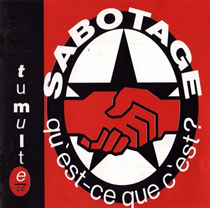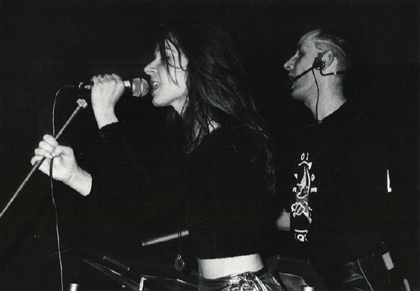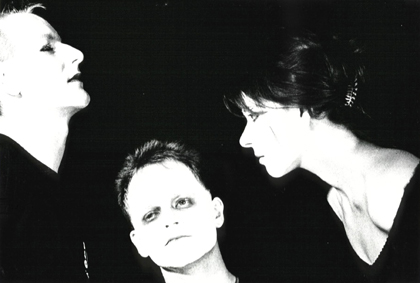|
IG:
That’s really very flattering, because that’s actually what I also liked
when I started with music: Siouxsie and the Banshees. I really liked her
attitude. Next to this I listened and still listen to nearly everything
except for extreme metal maybe. Everything can be an inspiration to me, so
your comparison to art is actually good, because after a great evening with
a Forsythe dance production, you can also go into the studio and maybe have
a really cool outcome. And honestly: I think all good artists have to be sad
or at least frustrated sometimes to write good songs. It’s like the old
story of the film guy who said: you need one sex scene and one scene where
someone is puking to make it a good movie! It’s true when you think about
it...
MM: In 1993, your debut CD, the excellent “Tumulte” came out on Danse Macabre. I know it’s quite a moment to hold your first “proper release” in your hands, how much do you remember of the build up and the moment itself? IG: Yes, it’s a special thing to have your first CD released, we did that in Florence Italy with Pankow. You work so much on any tiny little thing, so it’s almost like giving birth and you think everybody around has to understand why you are so excited. Of course everybody else thinks you’re crazy. But it was nice and it’s actually still nice when a release is ready and it’s still special. Making music is so much work and so much effort is in it, it’s really exhausting and therefore everybody involved is really happy when it’s done. MM: Your second release on M&E came not from yourselves directly, but from Matthias Lang’s legendary cassette label, Irre Tapes, a collection of ‘rare tracks and remixes’ entitled “In Your World” (M&E 236, Oct. 93). I don’t think I was really expecting to ever get another cassette album from you again by this time, everything seemed to be going so well for you. Following the huge success of your debut CD, you had another three CDs out in fairly quick succession; “Libertinage” (Dark Star), “Annorlunda” (Tatra Records) and “Les Enfants Sauvages” (Dark Star again). Had your growing successes already exceeded your own hopes and expectations and how were you, Marc and Detlef feeling about the future at this point? IG: Haha, it’s really cool how other people see this. We were asked to do an EP quickly after the album and Carlos Person was an ex member of Yello who we always admired, so we were happy he wanted to work with us. But the production was a nightmare and we were all completely unhappy with “Libertinage” regarding the producer work he did. Therefore we paid another EP from our own pockets, which was “Annorlunda” which means: being different. We worked with the people we trusted and liked and a Norwegian friend released it for us. We felt that “Libertinage” would ruin our reputation, so that’s why we did another EP in the first place. We also went on tour with a Norwegian band we met then and liked a lot. And “Les Enfants Sauvages” was a co-production with the Norwegian connection again. We had a French photographer we still have contact with who did a shooting in Paris with us for little money and worked with many music friends for this. It was a really special work and the most important thing for us then was that we have a product in the end that we could be proud of. We paid it all by ourselves, no money from the label btw, cover artwork, photos, everything. MM: Incidentally, I know Marc Werner is still involved in your life (obviously!), but I gather Detlef Weinreich left the band quite some time ago. Do you keep in touch? What’s he up to these days? |
IG: Detlef quit from his side, I think he didn’t have such a great time personally at that time and he kind of disappeared, he wanted no contact anymore and he’s not doing any music anymore either unfortunately. MM: In spite of your growing reputation, you were back adding to the M&E catalogue in the January of 1995 with “Maschinensturm” (M&E 282). Obviously the M&E faithful had really cottoned on to how good you were by then, the album registering your highest placing on our chart, going straight in at no.4! You collected a lot of respect and admiration for staying true to your underground roots in this way, probably made even more evident when your next CD, “Deutscher Herbst 77” was released as a limited edition on Olaf Seider’s New Band Underground label, a proper underground tape label, in fact the one that took over the German release of our “Flashbax Vol. 3” tape when Matthias Lang gave up doing Irre. To what extent was this all part of a greater philosophical view the band shared and do you feel your still releasing cassettes ever proved detrimental to your career ambitions? IG: We really never made any difference between one label or another. When you start as an artist because you have the inner need to do something, you don’t really think about aspects like: is he or she important for me or not. At least I believe you shouldn’t. You miss too much and if there was a rule or key to success a lot of people would just go for this. But we all know it’s not like that, so why should we think that underground is bad for us? It’s the people who love music and that’s what we have in common. We can only profit from each other, not money wise maybe, but again, that’s not our motor anyway. We never earned a lot of money from our music, the best result was that we could cover our expenses. We HAVE to do what we do and if nice people like Olaf Seider (we are still in touch), Matthias and you support our work, then that’s brilliant and really great for us, because you also reach the people who might enjoy what we’re doing.
|
|||||

.gif)
.gif)


